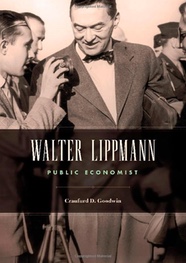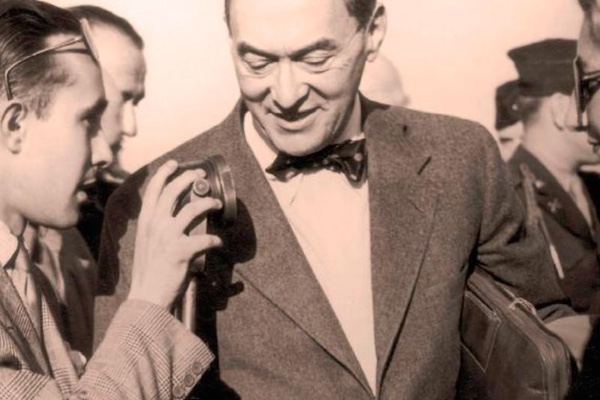Why Walter Lippmann Is Still Talked About
The distinguished American journalist Walter Lippmann (1889-1974) completed a broad curriculum in the social sciences at Harvard College and almost finished a master’s degree in philosophy. He toyed with the possibility of a career in academe but instead went into the media, first as assistant to the muckraker Lincoln Steffens, then as a founder of the New Republic and editor of the daily New York World. Finally he ran a syndicated column for the New York Herald Tribune and then the Washington Post. When the column began in 1931 he found the world in a sorry state: the Great Depression had begun, totalitarian governments were springing up in Europe, and what little international cooperation had been initiated after World War I seemed ineffective. From his school days Lippmann was remarkable self-confident. He was usually at the top of his class, could charm just about anybody , and he quickly became an accomplished writer. After the New York World closed he could easily have moved into government, business, or a university. Instead he set out to use the social sciences to enlighten the American people about what ailed them and what they could do about it. He proposed to do this just as the social sciences were erecting barriers to entry for amateurs through complex jargon and technique. Thus one of Lippmann’s first jobs was translation. He concluded quickly that the depression was the most critical issue of the moment, both for economic and political reasons; the rising level of the unemployed reduced the production of essential goods and services, but it also imperiled peace and freedom. He was certain that if men did not go to work they would go to war.
 Lippmann concluded that within the social sciences there must be answers to the current crises. Yet he did not feel well acquainted enough either to represent them fairly to the public or to sort the wheat from the chaff. To prepare himself to deal with the problems he read widely and deeply in the professional literature of economics and political science, and he communicated with the most prominent scholars in Europe and America. He was converted quickly to Keynesian macroeconomics by Keynes himself, that government must pay close attention to all the components of the demand for goods and services, and he insisted that after an initial burst of public expenditure in response to depression government must stimulate investment in the private sector. He became increasingly worried about schemes such as the National Recovery Administration that could weaken the free market system and threaten personal liberty. When World War II brought an end to the Great Depression Lippmann turned to foreign and defense policy where he found the American people were as ill-informed as they had been about the economy. Americans had been so enamored of isolationism that they had ignored foreign affairs. Once again he stepped into the breach and undertook another program of adult education of the American people. He was deeply impressed by how quickly and effectively America mobilized for war, but he worried that its leaders did not understand sufficiently the consequences of their actions. He became one of the most effective critics of the Vietnam war both because of what he thought was a misreading of the history and politics of Southeast Asia, and because the war drained precious resources from the solution of domestic problems promised under President Johnson’s Great Society projects.
Lippmann concluded that within the social sciences there must be answers to the current crises. Yet he did not feel well acquainted enough either to represent them fairly to the public or to sort the wheat from the chaff. To prepare himself to deal with the problems he read widely and deeply in the professional literature of economics and political science, and he communicated with the most prominent scholars in Europe and America. He was converted quickly to Keynesian macroeconomics by Keynes himself, that government must pay close attention to all the components of the demand for goods and services, and he insisted that after an initial burst of public expenditure in response to depression government must stimulate investment in the private sector. He became increasingly worried about schemes such as the National Recovery Administration that could weaken the free market system and threaten personal liberty. When World War II brought an end to the Great Depression Lippmann turned to foreign and defense policy where he found the American people were as ill-informed as they had been about the economy. Americans had been so enamored of isolationism that they had ignored foreign affairs. Once again he stepped into the breach and undertook another program of adult education of the American people. He was deeply impressed by how quickly and effectively America mobilized for war, but he worried that its leaders did not understand sufficiently the consequences of their actions. He became one of the most effective critics of the Vietnam war both because of what he thought was a misreading of the history and politics of Southeast Asia, and because the war drained precious resources from the solution of domestic problems promised under President Johnson’s Great Society projects.
Over the four decades during which Lippmann advised the American people on domestic and foreign policy they could feel that they were hearing from someone who was highly intelligent, exceptionally well-connected, enormously skilled as a journalist, well-informed about the social sciences, but never tied for long to party, ideology, or methodology. Typically he took everything into account that he thought was important and then he told it as he saw it. He had few prejudices and no client other than his readers, the American people. The one policy proposal to which he returned repeatedly over his career was for a broad liberal education as the bedrock of democracy. Therein he saw the social sciences anchored in a foundation of history, philosophy, creative literature and the arts. There has not been a journalist to equal Walter Lippmann since his time, but there is no reason to think that his career should not be a model for journalists of the future.
